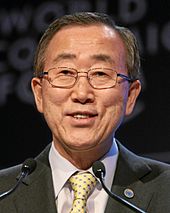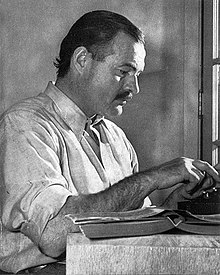 |
| Flag |
 |
| Emblem |
 |
| The Chilean delegation signing the UN Charter in San Francisco, 1945 |
The United Nations (UN) is an intergovernmental organization established on 24 October 1945 to promote international co-operation. A replacement for the ineffective League of Nations, the organization was created following the Second World War to prevent another such conflict. At its founding, the UN had 51 member states; there are now 193. The UN Headquarters is situated in Manhattan, New York City, and enjoys extraterritoriality. Further main offices are situated in Geneva, Nairobi and Vienna. The organization is financed by assessed and voluntary contributions from its member states. Its objectives include maintaining international peace and security, promoting human rights, fostering social and economic development, protecting the environment, and providing humanitarian aid in cases of famine, natural disaster, and armed conflict.
During the Second World War, US President Franklin D. Roosevelt initiated talks on a successor agency to the League of Nations, and the United Nations Charter was drafted at a conference in April–June 1945; this charter took effect on 24 October 1945, and the UN began operation. The UN's mission to preserve world peace was complicated in its early decades by the Cold War between the US and Soviet Union and their respective allies. The organization participated in major actions in Korea and the Congo, as well as approving the creation of the state of Israel in 1947. The organization's membership grew significantly following widespread decolonization in the 1960s, and by the 1970s its budget for economic and social development programmes far outstripped its spending on peacekeeping. After the end of the Cold War, the UN took on major military and peacekeeping missions across the world with varying degrees of success.
Secretaries-General of the United NationsNo.NameCountry of originTook officeLeft officeNote
1 Trygve Lie
 Norway 2 February 1946 10 November 1952 Resigned
Norway 2 February 1946 10 November 1952 Resigned2 Dag Hammarskjöld
 Sweden 10 April 1953 18 September 1961 Died in office
Sweden 10 April 1953 18 September 1961 Died in office3 U Thant
 Myanmar 30 November 1961 31 December 1971
Myanmar 30 November 1961 31 December 1971 4 Kurt Waldheim
 Austria 1 January 1972 31 December 1981
Austria 1 January 1972 31 December 1981 5 Javier Pérez de Cuéllar
 Peru 1 January 1982 31 December 1991
Peru 1 January 1982 31 December 1991 6 Boutros Boutros-Ghali
 Egypt 1 January 1992 31 December 1996
Egypt 1 January 1992 31 December 1996 7 Kofi Annan
 Ghana 1 January 1997 31 December 2006
Ghana 1 January 1997 31 December 2006 8 Ban Ki-moon
 South Korea 1 January 2007 Incumbent
South Korea 1 January 2007 IncumbentThe UN has six principal organs: the General Assembly (the main deliberative assembly); the Security Council (for deciding certain resolutions for peace and security); the Economic and Social Council (ECOSOC) (for promoting international economic and social co-operation and development); the Secretariat (for providing studies, information, and facilities needed by the UN); the International Court of Justice (the primary judicial organ); and the United Nations Trusteeship Council (inactive since 1994). UN System agencies include the World Bank Group, the World Health Organization, the World Food Programme, UNESCO, and UNICEF. The UN's most prominent officer is the Secretary-General, an office held by South Korean Ban Ki-moon since 2007. Non-governmental organizations may be granted consultative status with ECOSOC and other agencies to participate in the UN's work.
 |
| The current Secretary-General, Ban Ki-moon |
The organization won the Nobel Peace Prize in 2001, and a number of its officers and agencies have also been awarded the prize. Other evaluations of the UN's effectiveness have been mixed. Some commentators believe the organization to be an important force for peace and human development, while others have called the organization ineffective, corrupt, or biased.
The United Nations' system is based on five principal organs: the General Assembly, the Security Council, the Economic and Social Council (ECOSOC), the Secretariat, and the International Court of Justice. A sixth principal organ, the Trusteeship Council, suspended operations in 1994, upon the independence of Palau, the last remaining UN trustee territory.
Four of the five principal organs are located at the main UN Headquarters in New York City. The International Court of Justice is located in The Hague, while other major agencies are based in the UN offices at Geneva, Vienna, and Nairobi.Other UN institutions are located throughout the world. The six official languages of the United Nations, used in intergovernmental meetings and documents, are Arabic, Chinese, English, French, Russian, and Spanish. On the basis of the Convention on the Privileges and Immunities of the United Nations, the UN and its agencies are immune from the laws of the countries where they operate, safeguarding the UN's impartiality with regard to the host and member countries.
Wikipedia
World Events
1851 – William Lassell, discovers the moons Umbriel, and Ariel, orbiting Uranus.
1857 – Sheffield F.C., the world's oldest association football club still in operation, is founded in Sheffield, England.
1861 – The First Transcontinental Telegraph line across the United States is completed, spelling the end for the 18-month-old Pony Express.
1901 – Annie Edson Taylor becomes the first person to go over Niagara Falls, in a barrel.
1911 – Orville Wright, remains in the air 9 minutes and 45 seconds in a Wright Glider, at Kill Devil Hills, North Carolina.
1926 – Harry Houdini's last performance, which is at the Garrick Theater in Detroit
1929 – "Black Thursday" stock market crash on the New York Stock Exchange.
1930 – A bloodless coup d'état in Brazil ousts Washington Luís Pereira de Sousa, the last President of the First Republic. Getúlio Vargas is then installed as "provisional president."
1931 – The George Washington Bridge opens to public traffic.
1943 – The Provisional Government of Free India formally declared war on Britain and the United States of America.
1945 – Founding of the United Nations.
1946 – A camera on board the V-2 No. 13 rocket takes the first photograph of earth from outer space.
1947 – Walt Disney testifies before the House Un-American Activities Committee, naming Disney employees he believes to be communists.
1949 – The cornerstone of the United Nations Headquarters is laid.
1954 – Dwight D. Eisenhower pledges United States support to South Vietnam.
1957 – The USAF starts the X-20 Dyna-Soar program.
1964 – Northern Rhodesia gains independence from the United Kingdom and becomes the Republic of Zambia (Southern Rhodesia remained a colony until the next year, with the Unilateral Declaration of Independence)
1973 – Yom Kippur War ends.
1977 – Veterans Day is observed on the fourth Monday in October for the seventh and last time. (The holiday is once again observed on November 11 beginning the following year.)
1980 – The government of Poland legalizes the Solidarity trade union.
1986 – Nezar Hindawi is sentenced to 45 years in prison, the longest sentence handed down by a British court, for the attempted bombing on an El Al flight at Heathrow. After the verdict, the United Kingdom breaks diplomatic relations with Syria, claiming that Hindawi is helped by Syrian officials.
1990 – Italian prime minister Giulio Andreotti reveals to the Italian parliament the existence of Gladio, the Italian "stay-behind" clandestine paramilitary NATO army, which was implicated in false flag terrorist attacks implicating communists and anarchists as part of the strategy of tension from the late 1960s to early 1980s.
1992 – The Toronto Blue Jays become the first Major League Baseball team based outside the United States to win the World Series.
1998 – Launch of Deep Space 1 comet/asteroid mission
2002 – Police arrest spree killers John Allen Muhammad and Lee Boyd Malvo, ending the Beltway sniper attacks in the area around Washington, D.C.
2003 – Concorde makes its last commercial flight.
2004 – Arsenal Football Club loses to Manchester United, ending a row of unbeaten matches at 49 matches, which is the record in the Premier League.
2005 – Hurricane Wilma makes landfall in Florida resulting in 35 direct 26 indirect fatalities and causing $20.6B USD in damage.
2007 – Chang'e 1, the first satellite in the Chinese Lunar Exploration Program, is launched from Xichang Satellite Launch Center.
2008 – "Bloody Friday" saw many of the world's stock exchanges experience the worst declines in their history, with drops of around 10% in most indices.














